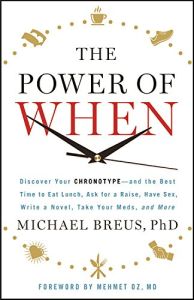Join getAbstract to access the summary!

Join getAbstract to access the summary!
Michael Breus
The Power of When
Discover Your Chronotype – and the Best Time to Eat Lunch, Ask for a Raise, Have Sex, Write a Novel, Take Your Meds, and More
Little, Brown US, 2016
What's inside?
Sync your daily activities to your internal biological clock to boost your energy, attentiveness and mood.
Recommendation
Your internal biological clock oversees the physical systems that determine your sleep and waking times and regulate your energy and attentiveness levels throughout the day. This internal timekeeper evolved when people planned activities around the rising and setting of the sun. People today often live in conflict with their internal timekeepers. Living out of sync with your “bioclock” causes insomnia and fatigue, undermines your health and contributes to mood disorders. Psychologist Michael Breus asserts that realigning your lifestyle with your body’s natural rhythm is relatively simple. Small changes to your schedule, such as altering when you go to bed, when you eat lunch or when you drink coffee, will provide a big payoff in terms of energy, mood and effectiveness. getAbstract recommends his manual to anyone looking to sweep away morning cobwebs or to stay conscious in a post-lunch meeting.
Summary
About the Author
Clinical psychologist Michael Breus, PhD, is a diplomate of the American Board of Sleep Medicine and a fellow of the American Academy of Sleep Medicine. He is an adviser and regular contributor to The Dr. Oz Show. He offers a short, free quiz for determining your chronotype at http://thepowerofwhenquiz.com.
















Comment on this summary